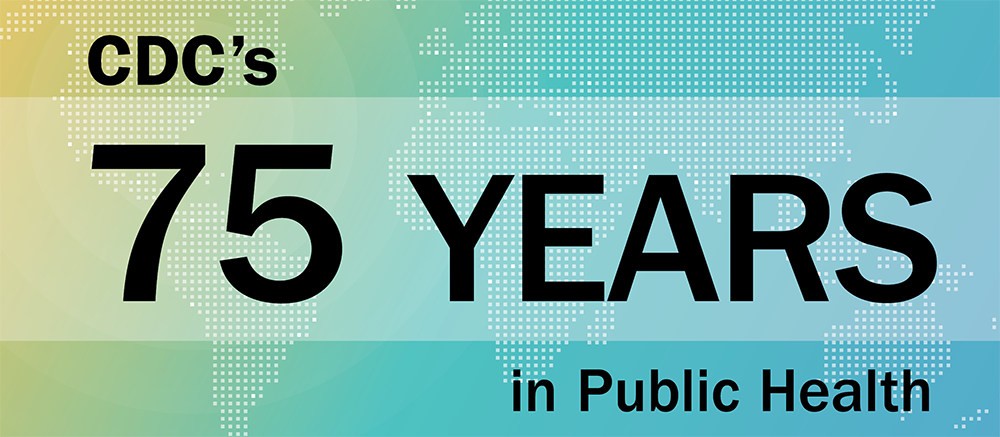CDC’s 75 Years in Public Health

Since it was established more than 75 years ago, the Centers for Disease Control and Prevention (CDC) has focused on issues of global health significance.
Founded as part of the U.S. Public Health Service in 1942, CDC’s predecessor, the Office of Malaria Control in War Areas, focused on malaria control in the southeastern United States, a major health problem in the region at the time. Since its inception in 1946, CDC carried the work of malaria prevention forward, and by 1951 when malaria was eliminated in the U.S., CDC’s mission had expanded.
Though 2021 marked 70 years since malaria was eliminated from the U.S., CDC continues to monitor malaria in the U.S., where there are still approximately 2,000 cases each year, mostly related to international travel. Today, CDC also helps health care providers promptly and correctly diagnose and treat malaria in the U.S. and educates U.S. citizens traveling abroad about malaria prevention. As with other infectious diseases, continued vigilance at home and abroad is needed as long as malaria remains present in the world.
CDC established the Center for Global Health (CGH) in 2010 to focus on important synergies across the global health portfolio, drawing on CDC’s unique expertise in global health security, epidemiology, surveillance, laboratory systems, emergency response, and workforce development. The Center for Global Health leads CDC efforts to work with U.S. government agencies, multilateral partners, and ministries of health in Africa, Asia, Latin America, Europe, and other regions. The Center is a steward of the agency’s domestic and global malaria and parasitic disease activities that date back to CDC’s origins, is a co-implementer of the President’s Malaria Initiative (PMI), along with the United States Agency for International Development (USAID), and is a key implementer of the U.S. President’s Emergency Plan for AIDS Relief (PEPFAR). In addition, the Center for Global Health oversees the implementation of programs to address leading causes of death worldwide, including tuberculosis, and implements prevention and vaccination activities across the globe. Through leveraging CDC’s longstanding partnerships and the agency’s unique scientific and technical capacities, CDC’s Center for Global Health works closely with ministries of health and other partners to implement programs and tackle profound health threats, including COVID-19.
True global health security requires equity in public health across the globe.
No community, district, or province within a nation will be truly safe and healthy until all are. No nation, including the United States can be truly safe until all nations have the core public health capabilities and the health systems in place to protect the most marginalized. This is why the Center for Global Health works on behalf of the American people to save lives around the world, partnering with other nations to prevent, prepare for, and respond to infectious disease threats. This work is integral to the CDC’s mission to protect Americans from health, safety, and security threats.
In 2010, CDC established the Center for Global Health, recognizing that domestic and global health are indivisible and that no country can protect the health of its citizens in isolation from the rest of the world.
CDC improves the health, safety, and security of Americans while reducing morbidity and mortality worldwide.
Health Impact: Save lives, improve health outcomes, and foster healthy populations
Health Security: Strengthen global public health prevention, detection, and response to protect Americans and populations worldwide
Public Health Science Leadership: Lead and influence the advancement of global public health science and practice